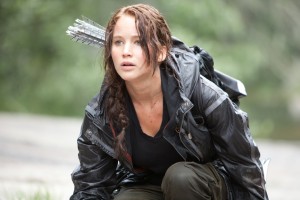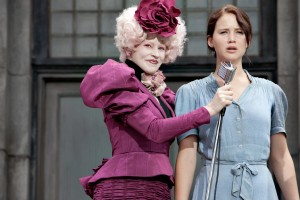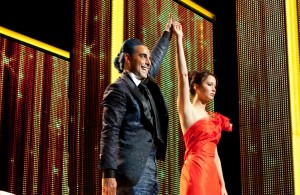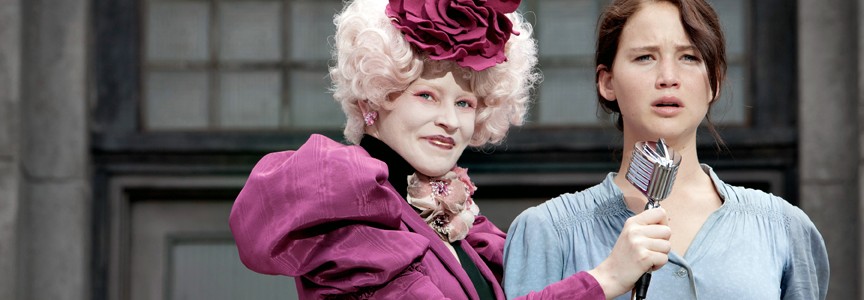‘The Hunger Games’ REVIEW: ‘Truman Show’ meets ‘American Idol’ meets Charles Darwin

The Hunger Games, the uber-successful first installment in a trilogy about a dystopian future, has ignited the worldwide box office and captured the imagination of millions. After sitting in a packed crowd for an IMAX screening of the film, it’s hard not be won over. The movie, which runs 142 minutes, is creative, engaging and, at times, adrenaline-pumping.
Still, after the film was over and the games complete, it was hard not to feel like I’d been there, done that. The movie, based on the successful book by Suzanne Collins, is a look into what could happen to our green, beautiful, peaceful Earth (ahem). Humanity is segmented into districts. Food is scarce. Fashion has become retro chic. There even seems to be more clouds in the sky. In other words, all of the checkmarks for a dystopian future are accounted for, and that’s the inherent challenge of The Hunger Games trilogy. It can dazzle us with its storytelling, but it all feels like a story that’s been told before (and better). Watching the Gary Ross-directed film is like watching an amalgam of The Truman Show, American Idol, Battle Royale and Charles Darwin’s The Origin of the Species. I suppose if it feels like so many other source materials than it has achieved a “new originality.”
This is not to discredit the story or its fine, fine cinematic adaptation. After all, they say there’s only seven original ideas in the universe (or was it six?). The execution of the tale is interesting and effective. Ross has chosen to get down in the trenches with the characters, refusing to make a “blockbuster-feeling” movie. There are no splashy special effects. The triumphant music by James Newton Howard is rather low key. Yes, the actors are all good-looking, but they’re mostly covered in dirt and strategically-located bumps and bruises. This is the most “un-blockbuster” blockbuster to hit cinemas, and for that, it deserves admiration.

Tom Stern’s cinematography is personal and hectic. Many of the scenes appear to be filmed with a handheld camera. This makes for some disorienting dystopia, but it adds a nice level of reality to the futuristic chronicle.
Anchoring the movie is a powerful performance from Jennifer Lawrence, an Oscar nominee for Winter’s Bone and one of Hollywood’s brightest young stars. She seems to be a little old for the role of Katniss Everdeen, a teenager from District 12 who volunteers to fight in the deadly Hunger Games, but Lawrence is able to pull off a believable portrait.
In her coal-mining home, where poverty is rampant and food is rare, Everdeen is a hunter by day and second mother to her little sister by night. It only takes a few minutes for Katniss and Primrose (Willow Shields) to head off to a compound for an annual event known as the Reaping. One boy and one girl are selected from the teenage pool of candidates to represent District 12 at the Hunger Games, a fight-until-death battle that passes as television entertainment for the people of the world. The reasoning behind all of these silly rituals is largely missing from the movie. The screenwriting team — including Collins, Ross and Billy Ray — focus more on action than subtext. There’s mention of a past war that ended with the creation of the districts and the annual contest, but The Hunger Games never trips over the mythology of its story. It takes everything at face value and continues into the dark, dark future.

At the Reaping, Primrose is chosen, but Katniss steps forward and volunteers herself. After she’s paired with another boy from the village (Peeta Mellark, played by Josh Hutcherson), the two head off to the capital city to prepare. Their guides are Effie Trinket (Elizabeth Banks), an eccentric woman with a penchant for layers of makeup, and Haymitch Abernathy (Woody Harrelson), a past winner of the Hunger Games who now enjoys too much wine and food.
The largest chunk of the movie involves the preparation and spectacle of presenting the teenagers (called tributes) to the throngs of audience members in the capital. Caesar Flickerman (Stanley Tucci) is the emcee of the proceedings, while Seneca Crane (Wes Bentley) directs the process. President Snow (Donald Sutherland) presides over everything like a demigod.
The actual games feature cutthroat survivalism and violent acts of desperation. The Hunger Games earns its PG-13 rating, showing teenagers killing other teenagers.
The acting is enjoyable and appropriately exaggerated. Tucci is pitch-perfect as he interviews each of the tributes, and I enjoyed Toby Jones as his color commentator. Bentley isn’t cold-blooded enough for his role, and Sutherland’s characters feels underwritten. The real gem is Lawrence, who single-handedly makes the movie a watchable and entertaining project.
The final third of the film, which features the actual games, is the weakest part. I won’t spoil the details for the uninitiated, but it doesn’t take a rocket scientist to figure out the many twists and turns of the contest.
The feeling when the ending credits emerge should be one of excitement and anticipation for the second installment. But there’s an odd ho-hum feeling at the conclusion of The Hunger Games. In many ways, it feels so right and so enjoyable. This is a franchise both young and old, male and female can enjoy immensely. There’s not a brainless vampire in sight. But still the premise of the book and its execution on the silver screen feel too much like an extension of a story already told.
For fans of The Truman Show, it’s hard not to think of Ed Harris’s Christof. For fans of The Most Dangerous Game or Battle Royale, it’s hard not to envision similarly plotted death competitions. For fans of American Idol, it’s hard not to see the movie’s pomp and circumstance as a direct parallel to the reality series. Yes, The Hunger Games should critique and mock and pay tribute to our past and present. After all, that’s the whole point of any good dystopian future: We’re supposed to see our society dangerously headed in this direction. But, still, there shouldn’t be so many bells of familiarity. When surviving in the woods, with only a bow and arrow for comfort, the worst feeling to endure is one of deja vu.
By John Soltes / Publisher / John@HollywoodSoapbox.com
-
The Hunger Games
-
2012
-
Directed by Gary Ross
-
Written by Ross, Suzanne Collins and Billy Ray; based on the book by Collins
-
Starring Jennifer Lawrence, Stanley Tucci, Woody Harrelson, Wes Bentley, Elizabeth Banks, Liam Hemsworth, Josh Hutcherson, Toby Jones and Donald Sutherland
-
Running time: 142 minutes
-
Rated PG-13 for intense violent thematic material and disturbing images, all involving teens
-
Rating:




Revised: September 2014

